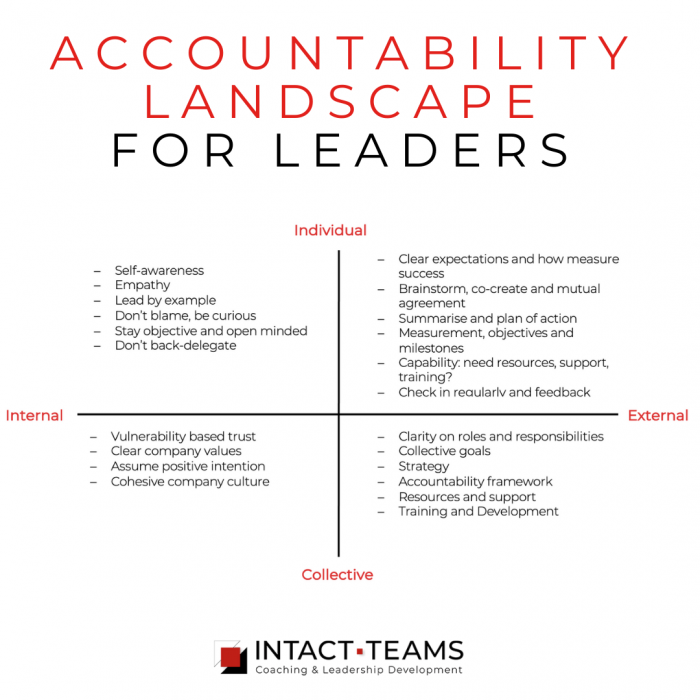‘I don’t understand why she hasn’t delivered what was expected’ or ‘They know what I usually expect so no need to explain’ or ‘We need to hold our teams more accountable’ are typical statements I hear from leaders experiencing a lack of follow-through from individuals or their teams.
I witness leaders being quick to point the finger. But accountability is not about blame. Accountability is about ownership, respect for actions and responsibility for results. Leaders seem unaware that accountability starts with self-awareness, a look inside, our own attitude and actions. I often discover that a lack of accountability comes from unclear expectations and lack of resources or capabilities.
I have developed a simple model that shows steps and strategies for leaders to build the foundation for setting expectations and asking for accountability:

Individual/Internal (top left):
Leaders should start with creating or increasing self-awareness. Explore how well you showcase accountability. If we don’t walk the talk ourselves, we can’t expect accountability from others. Are we delivering on our commitments consistently? Also check in how objective you are when addressing a lack of accountability. Are you getting tense and start blaming people or are you looking for dialogue with curiosity to find out what went wrong? A big no-no is back-delegating. Once you have delegated something, don’t take it back and do it yourself, it will only result in frustration.
Individual/External (top right):
Here are steps and strategies to improve accountability when managing individuals. I find that underperformance often comes from leaders not being clear on what exactly is expected. A wish-washy, top level indication is not good enough. People can’t look into your head, so you need to explain clearly what is expected, by when, how, who else is involved and maybe even the why. To get more buy-in, I suggest to brainstorm and co-create. I know this is not always possible (everyone needs to get stuff done and has KPIs) but include it more often than not. Then summarise what’s expected with a clear plan of action. Especially if you work in multi-cultural settings, get people repeat back for shared meaning as language barriers can often cause misunderstandings. Agree on milestones and measurements, there is nothing worse than setting expectations and not following up. One thing leaders often forget, is to check if the team member has the capability to achieve what’s expected. If you are not sure, ask them. This is about the knowledge and skills as well as resources and time. And last, check in as agreed and give feedback. Don’t attack the person if they haven’t delivered but use a model like SBI (Situation, Behaviour, Impact) for constructive feedback. (read blog about SBI: https://www.intactteams.com/creating-a-feedback-culture/
Collective/External (bottom right):
‘We need to hold our teams more accountable’ is a phrase I hear time and time again in organisations. Of course, everything leaders do with individuals (individual/external in landscape) is valid and important in this segment too but here we focus on where lack of accountability shows up in groups, teams or organisations. What I find is that there is a lack of clarity on what people are actually responsible for and organisational structures and resources are not readily available for people to meet expectations. And that’s on the organisation to figure out. Check critically if roles and responsibilities are clear, documented and communicated. Especially in new set-ups, fast growing businesses and in time of change, this can fall by the sideway. Make sure that not only individual goals are clear but also collective goals are aligned so that everyone works towards the same achievements. As an organisation enable and set strategies that are clear and visible to everyone involved, even better if the strategies are developed by the people achieving milestones and goals. Accountability frameworks are key to measure success. Use effective software and technology and make sure that the team or organisation provides resources, support and training so that individuals and groups have the ability to succeed. This often starts with an effective onboarding process.
Collective/Internal (bottom left):
As an organisation we need to ensure our inner game is ready to ask for accountability. This goes beyond steps to ensure expectations are clear and we have a strategy. We can only make the accountability game a successful one if we have created vulnerability based trust (where our people admit mistakes and ask for help), we have clear company values that align with the behaviour we promote and encourage. We have to ensure that the company culture not only enables accountability but promotes accountability.
When you ask yourself the question: ‘How do I get my people to be more accountable for results?’ the answer is: It depends. Which of the four quadrants have you neglected?
If you want to work with me contact me on info@intactteams.com








